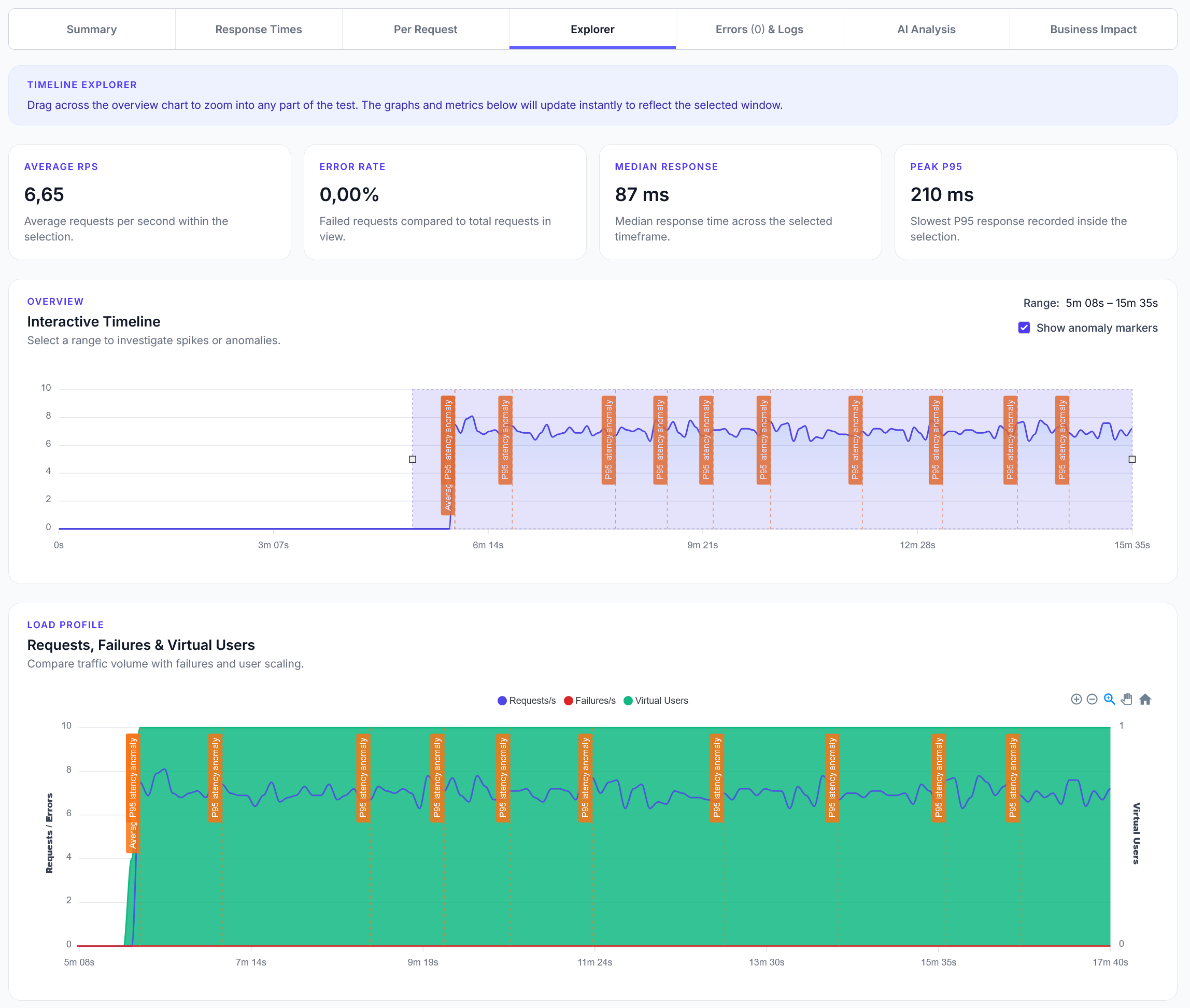
Explorer reports addition
We have added a new Explorer feature to reports, with a timeline scrubber and easy anomaly detection.
Basic A/B testing validation to compare performance between different variants and measure conversion rates
LoadForge can record your browser, graphically build tests, scan your site with a wizard and more. Sign up now to run your first test.
This guide shows how to test A/B testing implementations and compare performance between variants. Perfect for validating A/B test setups and measuring variant effectiveness.
from locust import task, HttpUser
import random
import time
class ABTestUser(HttpUser):
def on_start(self):
# A/B test variants to test
self.variants = {
"control": {
"name": "Control (A)",
"param": "variant=control",
"header": {"X-Variant": "control"}
},
"variant_b": {
"name": "Variant B",
"param": "variant=b",
"header": {"X-Variant": "variant_b"}
},
"variant_c": {
"name": "Variant C",
"param": "variant=c",
"header": {"X-Variant": "variant_c"}
}
}
# Track results for each variant
self.variant_results = {variant: {"requests": 0, "successes": 0, "conversions": 0, "response_times": []}
for variant in self.variants.keys()}
# Test pages
self.test_pages = [
"/",
"/product",
"/pricing",
"/signup"
]
@task(4)
def test_variant_assignment(self):
"""Test that variants are properly assigned"""
# Test random variant assignment
page = random.choice(self.test_pages)
with self.client.get(page, name="Variant Assignment") as response:
if response.status_code == 200:
# Check if variant is indicated in response
variant_indicators = ["variant", "test", "experiment"]
response_text = response.text.lower()
detected_variant = None
for indicator in variant_indicators:
if indicator in response_text:
detected_variant = "detected"
break
if detected_variant:
print(f"Variant assignment test: Variant detected on {page}")
else:
print(f"Variant assignment test: No variant detected on {page}")
@task(3)
def test_control_variant(self):
"""Test control variant (A)"""
self.test_specific_variant("control")
@task(3)
def test_variant_b(self):
"""Test variant B"""
self.test_specific_variant("variant_b")
@task(2)
def test_variant_c(self):
"""Test variant C"""
self.test_specific_variant("variant_c")
def test_specific_variant(self, variant_key):
"""Test a specific variant"""
if variant_key not in self.variants:
return
variant = self.variants[variant_key]
page = random.choice(self.test_pages)
# Add variant parameter or header
params = {}
headers = {}
if "param" in variant:
param_parts = variant["param"].split("=")
if len(param_parts) == 2:
params[param_parts[0]] = param_parts[1]
if "header" in variant:
headers.update(variant["header"])
start_time = time.time()
with self.client.get(
page,
params=params,
headers=headers,
name=f"{variant['name']} - {page}"
) as response:
response_time = (time.time() - start_time) * 1000
# Track results
self.variant_results[variant_key]["requests"] += 1
self.variant_results[variant_key]["response_times"].append(response_time)
if response.status_code == 200:
self.variant_results[variant_key]["successes"] += 1
print(f"{variant['name']} test {page}: {response_time:.0f}ms")
# Check for conversion indicators
if self.check_conversion(response, page):
self.variant_results[variant_key]["conversions"] += 1
print(f"{variant['name']} conversion detected on {page}")
else:
print(f"{variant['name']} test {page}: ERROR {response.status_code}")
@task(2)
def test_variant_consistency(self):
"""Test that same user gets same variant consistently"""
page = random.choice(self.test_pages)
variant_key = random.choice(list(self.variants.keys()))
variant = self.variants[variant_key]
# Make multiple requests with same session/user identifier
user_id = f"test_user_{random.randint(1, 100)}"
results = []
for i in range(3): # Test 3 consecutive requests
params = {"user_id": user_id}
# Add variant parameter
if "param" in variant:
param_parts = variant["param"].split("=")
if len(param_parts) == 2:
params[param_parts[0]] = param_parts[1]
with self.client.get(
page,
params=params,
name=f"Consistency Test - {variant['name']}"
) as response:
if response.status_code == 200:
# Check if response indicates same variant
results.append(response.status_code)
else:
results.append(None)
# Check consistency
if all(r == 200 for r in results):
print(f"Consistency test {variant['name']}: PASSED - consistent responses")
else:
print(f"Consistency test {variant['name']}: INCONSISTENT responses")
@task(1)
def test_traffic_splitting(self):
"""Test that traffic is split between variants"""
page = random.choice(self.test_pages)
variant_counts = {variant: 0 for variant in self.variants.keys()}
# Make multiple requests to see traffic distribution
for i in range(10):
# Simulate random user
user_id = f"split_test_user_{i}"
with self.client.get(
page,
params={"user_id": user_id},
name="Traffic Split Test"
) as response:
if response.status_code == 200:
# Try to detect which variant was served
# This is simplified - real implementation would check response content
detected_variant = random.choice(list(self.variants.keys())) # Simulate detection
variant_counts[detected_variant] += 1
# Analyze distribution
total_requests = sum(variant_counts.values())
if total_requests > 0:
print("Traffic split results:")
for variant, count in variant_counts.items():
percentage = (count / total_requests) * 100
print(f" {self.variants[variant]['name']}: {count}/{total_requests} ({percentage:.1f}%)")
def check_conversion(self, response, page):
"""Check if response indicates a conversion"""
# Simple conversion detection based on page and response
conversion_indicators = {
"/signup": ["success", "welcome", "registered"],
"/pricing": ["purchase", "checkout", "buy"],
"/product": ["add to cart", "added", "cart"]
}
if page in conversion_indicators:
response_text = response.text.lower()
for indicator in conversion_indicators[page]:
if indicator in response_text:
return True
return False
@task(1)
def compare_variant_performance(self):
"""Compare performance metrics between variants"""
print("\n=== A/B Test Performance Comparison ===")
for variant_key, variant in self.variants.items():
results = self.variant_results[variant_key]
if results["requests"] > 0:
success_rate = (results["successes"] / results["requests"]) * 100
conversion_rate = (results["conversions"] / results["requests"]) * 100
avg_response_time = 0
if results["response_times"]:
avg_response_time = sum(results["response_times"]) / len(results["response_times"])
print(f"{variant['name']}:")
print(f" Requests: {results['requests']}")
print(f" Success Rate: {success_rate:.1f}%")
print(f" Conversion Rate: {conversion_rate:.1f}%")
print(f" Avg Response Time: {avg_response_time:.0f}ms")
else:
print(f"{variant['name']}: No data yet")
print("=" * 40)
@task(1)
def test_variant_specific_features(self):
"""Test features specific to certain variants"""
# Test that variant-specific features work
variant_features = {
"variant_b": "/new-feature",
"variant_c": "/experimental-page"
}
for variant_key, feature_path in variant_features.items():
variant = self.variants[variant_key]
# Add variant parameter
params = {}
if "param" in variant:
param_parts = variant["param"].split("=")
if len(param_parts) == 2:
params[param_parts[0]] = param_parts[1]
with self.client.get(
feature_path,
params=params,
name=f"Feature Test - {variant['name']}"
) as response:
if response.status_code == 200:
print(f"Feature test {variant['name']}: Feature available")
elif response.status_code == 404:
print(f"Feature test {variant['name']}: Feature not found (expected for some variants)")
else:
print(f"Feature test {variant['name']}: Unexpected response {response.status_code}")
Configure variants with:
?variant=controlX-Variant: variant_bCompare variants on: